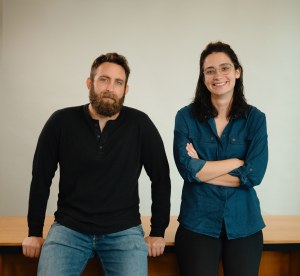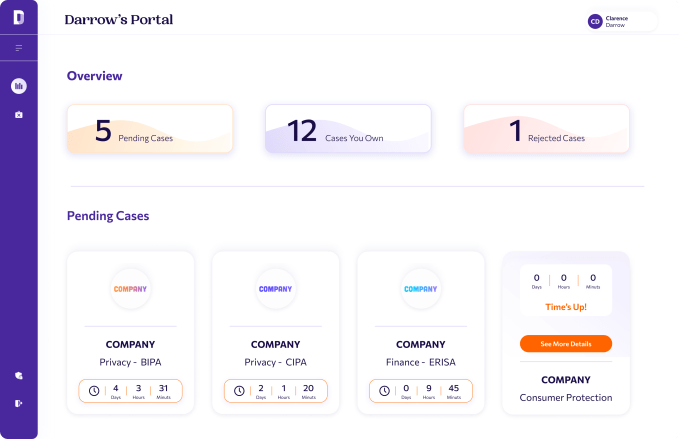The U.S. is famous (or infamous) for its litigiousness: The country may not have the highest per capita amount of lawsuits (that’s Germany), but it has the most of any country overall amid a very active legal industry whose caseload is growing in a market that is worth many tens of billions of dollars. Now, an AI-based startup that’s tapping into those facts for its own business is announcing a round of funding.
Darrow — which has developed an AI-based data engine that ingests large amounts of publicly available documents to search for class action litigation potential across areas like data privacy violations and environmental contamination — has raised $35 million.
The funding is coming in the wake of a strong run in the last couple of years: Darrow says that active cases that were started as a result of its data insights currently total around $10 billion in claims.
Now, it plans to use the funding to hire more engineers and business development talent; add more areas of focus (new legal domains) to its search and analytics tools; and invest in expanding its large language models and other technology assets.
This Series B was led by B2B specialist Georgian, with F2 and previous backers Entrée Capital and NFX also participating. Including this latest round, Darrow has raised just under $60 million from investors that also include Y Combinator (where it was part of its W21 batch) and R-Squared Ventures.

The startup, headquartered in NYC with offices also in Tel Aviv, was founded in 2020 in the wake of COVID-19. The pandemic signaled a shift in how lawyers worked, according to Evyatar (Evya) Ben Artzi, the CEO who co-founded the company with CTO Gila Hayat: “They started to look online for leads, for cases, all the time,” he said in an interview.
Darrow is not disclosing its valuation, nor any details about revenues. But Ben Artzi said that there are now some 50 law firms currently using the product, covering hundreds of lawyers, to be more proactive in how they find and develop new cases to pursue.
“There are a lot of other violations out there. We are not finding everything yet. So we want to scale our Large Language Model to detect other egregious activity,” said Ben Artzi in an interview. “We want to be the go-to for law firms out there. Right now there is a lot of legal labor that wants to be deployed. Lawyers want to work and fight for the most pressing matters of society. We want to be the place where they can find cases that will be impactful.”
The idea of a firm looking for people to sue might bring a bitter taste to some people’s mouths, with thoughts of how the court system sometimes gets abused with costly, spurious suits in areas like personal injury and patent infringement. Perhaps anticipating that — or perhaps because Darrow really does have a moral purpose — the startup has a very different spin on the matter.
Class action suits are often perceived as too pricey and risky for law firms to take on, and it’s often only the biggest firms that have teams to proactively seek out interesting cases and the resources to fight them; on the lawyer side, it’s usually only the biggest names that are proactively sought out by would-be plaintiffs to begin any process, leaving smaller players on the sidelines.
But the way Ben Artzi sees it, every lawyer wants to find and fight the good fight (the startup’s name itself is a reference to Clarence Darrow, the famous civil liberties lawyer). And just because something is harming only dozens of people, and not millions, does not mean it’s not worth the investment to fight.
Yet because the costs and other requirements are high, “Only the biggest cases get their day in the spotlight,” he said.
The company describes its technology as a “justice intelligence” platform, in effect a predictive analytics engine optimised not for business intelligence, but for patterns that indicate a legal violation and potential litigation: business development for lawyers.
Darrow works by crawling thousands of sources of publicly available information — newsfeeds, social media chatter, consumer complaints filed with regulators and other organizations, administrative reports, SEC filings, environmental reports, court dockets and more — ingesting all of it and “connecting dots” between data and evidence of violations and harmful results, or the potential of them. It also supplies a predicted legal outcome of a potential case, and what the value might be.
For lawyers whose interest might be piqued by all that, they can further use the platform to start their process of review and discovery. Darrow does not act as a “black box”: it also employs a team of legal data specialists, including former lawyers, to review the insights and patterns.

The startup has identified environmental violations, examples of personal data breaches, examples of discrimination at banks, employers who pay women less than men, fraudsters, antitrust violations and more.
Darrow has chosen lawyers as its initial target customer segment. That’s not just because they are increasingly already getting very accustomed to using other AI tools, albeit many of them are for handling workflows, admin and compliance (examples include Doctrine, Aware, Casetext, and Juro). They are also the ones who are the most financially motivated to find new cases. They pay upfront on a per-case basis for the data — that is, no pro bono model.
But because the idea is to help give individuals a louder legal voice, the company over time may well create a portal and business model for individuals to look for data that might be relevant to them, and to report data of their own.
“We are looking to identify the most impactful players, and we realized that missing link starts with litigators, but consumers are part of the long-term vision. They are crucial. They are the reason we started this,” said Hayat in an interview. Her and Ben Artzi’s approach indeed started from their own person experience. “He’s the litigator and I’m the angry consumer, and my contribution here was software,” she added. Of course, as with any AI venture, the key will be watching how closely the company and the tech it has built sticks to its ideals, but for now its positive focus points to a big enough opportunity.
“Darrow’s founders recognized a gap in the $63 billion class and mass action market and developed an innovative language model to transform the scale and impact of litigation teams,” said Georgian lead investor Margo Wu, in a statement. “The company’s mission-driven team of lawyers, technologists, and product developers were a key reason to invest.”































Comment